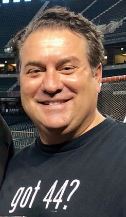UPDATE, 12/18, 1:10pm: The County Board of Supervisors voted 4-1 to file a legal action in Maricopa County Superior Court to determine what can and should be turned over to the State Senate in response to the election-related subpoenas. The vote came after approximately 7 1/4 hours of Executive Session deliberation time (Wednesday and today). (The Supervisors were not sequestered.)
The majority of the post-election battles have now moved from the courts to several state legislatures, and Arizona's is trying to move to center stage. In fact, the one we are watching most closely now are the subpoenas that State Senate President Karen Fann and Eddie Farnsworth have served on the Maricopa County Board of Supervisors.
Both the subpoenaing Senators and the County recipients are almost entirely Republican, which may be the reason behind the drama.
As noted earlier, the two subpoenas are for digital images of all of the early ballots (i.e. the vast majority of ballots cast) and nearly all of the election equipment and information used in the election process. The legislators are looking to do audits on the information, in an effort to show that fraud tipped the outcome from Donald Trump to Joe Biden. The subpoenas give the County until Friday to comply.
The County Board of Supervisors - controlled by Republicans, 4-1 - met in Executive Session for 4 1/2 hours Wednesday, receiving legal advice from the Maricopa County Attorney's Office (also, Republican) and discussing their options. They adjourned without making any public decisions and set a new Executive Session for Friday morning.
What are some of the laws that the Supervisors need to consider in responding to their counterparts, and maybe avoiding a nasty legal fight over the subpoenas? We invited a couple of fellow election law attorneys to help explain the situation.
Our first expert has been involved in some of the predecessor legal battles - the current evolutionary period goes back to the infamous 2000 Presidential election which ended up in the U.S. Supreme Court. This attorney shared a great summary, but wishes to keep his/her name out of this increasingly-nasty fray:
Arizona law requires that after the canvass, county election officials deliver the ballots cast in that election in sealed packages to the county treasurer, who must place them in the treasurer’s secure facility for 24 months, before destroying them without opening the packages. Another statute extends that to “electronic data from and electronic or digital images of ballots [must be] protected from physical and electronic access”. Similarly, any media used to program or operate a tabulation device or “used in compiling vote totals shall be kept under lock and seal.” None of these laws provides for turning over ballots, ballot images, or programs used in the tabulation process in response to a subpoena, whether issued during litigation or by a legislative committee. Indeed, the law expressly allows a court to order production of ballots or ballot images only if it is overseeing an election contest filed within six months of the election.
Given these provisions for securing ballots and other election-related materials, Maricopa County is in the unenviable position of choosing between violating state law or being held in contempt of the Legislature. The County could object to the subpoena and force the Legislature to take further steps to enforce it. Or, it could try a more cooperative solution by negotiating with Senator Farnsworth’s committee to jointly seek a court order allowing the County to provide the requested materials. A court order could have the added benefit of imposing court-enforceable protections on how the materials are used and secured once provide to the Legislature.
His/her first paragraph makes it clear that previous sessions of the GOP-controlled Arizona Legislature have already passed "election integrity" laws and have tried to balance those considerations with privacy issues, with the mostly-Republican Governors signing those laws into effect.
You could easily view the current lawmakers' subpoena efforts as a way of making "new election law on the fly, something not permitted in our system of government."
Tom Ryan, an East Valley attorney who has long been involved in election law cases (mostly for Republican interests), also weighed in for Arizona's Law/Arizona's Politics readers:
If I were the County, I would (1) respond to the subpoena by pointing out the statutory protections afforded to the ballots and the program software, (2) would not turn over the data citing these statutes, and (3) advise Eddie F if he wants it all he can go to court and ask for it. I believe the County (a) has a duty to follow the law as currently existing and (b) has a duty to protect the privacy of the ballots on behalf of all voters. I don’t see this duty as waivable by the County, any more than the attorney client privilege is waivable by the attorney alone. But, hey, what do I know. I’m just a little guy from the dusty, dirty cotton town of Chandler.
As both of our experts suggest, yesterday's decision to continue the meeting until Friday may be an indication that there are discussions taking place behind the scenes. And, if the County decides on Friday morning to turn over all requested information, we might see others virtually running up the courthouse steps seeking a court order halting any turnover.
Further complicating the situation is that there are still court cases actively being pursued by the same parties clamoring for new election integrity measures. Arizona GOP Chairwoman Kelli Ward and the state party have appealed two different cases. Their "Arizona Kraken" case in federal court is on appeal to the 9th Circuit and their state court election contest is currently pending appeal to the U.S. Supreme Court.
Maricopa County has suggested that they were prepared to conduct additional auditing measures, but could not while litigation is pending.
*Part of the headline was prompted by a popular thread on Twitter today. This QAnon-related account compared Donald Trump and last month's election to when "the Roman Senate ordered Julius Caesar to disband his army and return home or become an "Enemy of the State"."
"AZ Law" includes articles, commentaries and updates about opinions from the Arizona Supreme Court, U.S. Supreme Court, as well as trial and appellate courts, etc. AZ Law is founded by Phoenix attorney Paul Weich, and joins Arizona's Politics on the internet.
AZ Law airs on non-profit Sun Sounds of Arizona, a statewide reading service that provides audio access to printed material for people who cannot hold or read print material due to a disability. If you know someone who could benefit from this 24/7 service, please let them know about member-supported Sun Sounds. And, YOU can donate or listen here.
Previous episodes of AZ Law can be streamed or downloaded here, or wherever you get your podcast.














